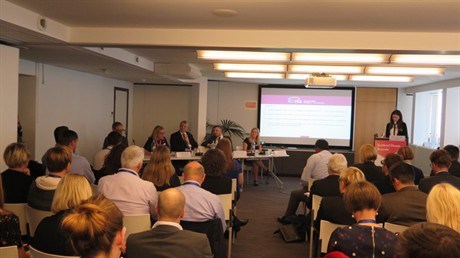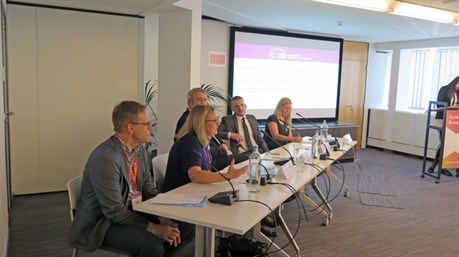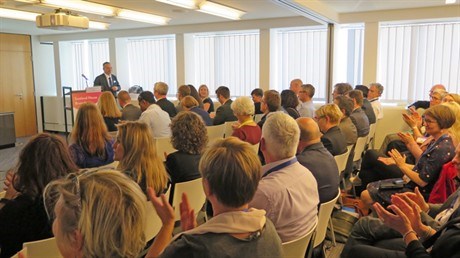Seminar about Sustainable development of the Arctic to the benefit of all of Europe during the European Week of Regions and Cities 2018
The Arctic seminar took place at Scotland House the 9th of October during the European Week of Regions and Cities and focused on smart specialization, innovation and capacity building and attracted a big group of participants representing a wide geographical and institutional coverage. The seminar was followed by the Arctic Award prize ceremony for the best Arctic cooperation projects 2018.
The seminar was arranged as part of the European week of regions and cities 2018 by the Regional Partnership of Northern European Arctic, consisting of northern Sweden, Finland and Norway in the Northern Sparsely Populated Areas (NSPA), the Highlands and Islands of Scotland and Arctic Consensus of North Denmark and Greenland.
The main focus for the participants in the panel was directed partly towards how the Arctic regions can foster their own development capacity in the future along with the facilitating role the EU can play for the continues regional development, partly how the arctic regions can ensure that the social society is able to attract the younger generation to stay in the Arctic regions.

Arctic - both in the periphery and in the middle of everything
The participants were welcomed by Mike Neilson, director for Scotland House hosting the event, and Anna Pettersson, representing the Lead Partner of Region Västerbotten. Both addressed the positive cooperation that for the third time engaged the NSPA and Scotland in a common seminar in a full house at Scotland House during EWRC and Anna Pettersson welcomed especially the fact that the Arctic family is growing, this year also engaging Arctic Consensus from Denmark and Greenland.
Alessia Clocchiatti, European Commission's Directorate-General for Maritime Affairs, was the moderator and started by presenting the EU Commission's report from the consultation process focused on the EU's own Arctic regions. The one who once entered the Arctic community never wants to come from there, she added.
In the report, the European Commission has compiled the most important messages from the Arctic forum process engaging the stakeholder in the Arctic in order to pinpoint the challenges of the regions and come closer to solutions that deliver sustainable growth, primarily investment priorities and ways to better utilize the EU's arctic fund programs. Alessia Clocchiatti, European Commission DG Mare, expressed;
- Innovation is the key for the Arctic, especially when it comes to handle the climate change.
Jukka Teräs, The Nordic Council of Ministers research institute of Nordregio, continued on the same topic and declared the need of smart specialization which one can find in competitive advantages in the Arctic regions as well as looking beyond natural resources and also consider the potential of strengthened creative sectors and the social dimensions. The arctic region has already come a long way in it is strategical development through transregional and international collaboration, and don't let us forget that the Arctic networks would never had been that successful without great support from the EU. Jukka Teräs also pointed out that it is sad that the OECD rapport, which often is highlighted in EU, only pinpoints traditional resources and industries which does not include social dimensions and creative industries which are also important for the development of the arctic regions.
- Arctic is a hot spot. It's not in the periphery, it is sometimes even in the middle of everything in some aspects, according to Jukka Teräs.
Discussions with focus on what is needed for a sustainable Arctic
The introductory presentations were followed by a panel discussion where Magnus Davidson, University of Highlands and Islands, highlighted that Scotland want to frame itself as the closest neighbour to the Arctic and due to its geographical location, it is possible for Scotland to identify with the Arctic regions when challenges such as sparsely population are mutual. Scotland can also contribute with academic competence and science which can benefit the arctic regions in the long term.
The social dimension and its impact on sustainable development of the arctic was another reoccurring topic during the seminar. Päivi Ekdahl, Regional Council of Lapland, raised the problems of attracting young people to stay in the Arctic regions as a challenge for regional growth. She was drawing the attention to that often do the people themselves in the northernmost regions deliver negative attitudes about the possibilities to stay and thrive that follows to the next generation. We need instead to be proud of our regions and their uniqueness was her message.
Lise-Lotte Terp, Arctic Consensus, stated that the local perspective must be the priority and that deepened knowledge and respect for culture contributes to better projects with results that can live on beyond the end of the projects. From a Greenlandic perspective it is a challenge to make youngsters to get education on the same term as term as for example their Danish counterparts to be able to return and contribute to their home society.

On the same note Peter Sköld, Center for Arctic research at University of Umeå, emphasized the right of the citizens of the Arctic to set the goals and the implementation of regional development processes to assure that citizens have the power to affect their own lives. He pointed out that Arctic isn't an exotic place where people living in the big cities can go in order to get resources and statistics. Arctic is not an isolated place, it must and should take part in global cooperation to be able to build a common sustainable development. According to Peter Sköld, time perspective is crucial for sustainability. Where the modern society has a horizontal time perception which don't learn from its history, indigenous people sees the time as circular. This is why it is important that we ask ourselves what the final goal is when starting projects in the Arctic and that tools and goals are renewed for evaluation.
- It is the people of the Arctic that is the resource of the Arctic, said Peter Sköld.
Finally, Willy Ørnebakk, Chair of Troms County Government, stated that innovation is not only important for the sustainable development of the arctic region, but that the diverse arctic region is also the home of many innovative actors in the forefront of developing solutions to many of the problems the union and the world faces.
-We are not only seeking for solutions, we can also provide solutions, said Willy Ørnebakk.

Arctic Award 2018
The seminar was followed by the Arctic Award 2018 prize ceremony by the Arctic Cooperation, the cooperation between the EU programmes in the Arctic region. The prize in two categories this year, Arctic entrepreneurial spirit respectively cold climate opportunities, was introduced by Kirsti Mijnhijmer from the Northern Periphery and Arctic Programme and handed out by Pierre-Emmanuel Leclerc from the EU commission DG Regio. Winners was the projects Rural Youth Entrepreneurship - RYE Connect, working on a rural youth entrepreneurship model in the northernmost regions, and WindCoE, a project engaged in establishing a competence centre for wind power in cold climate.
Read more about the arctic consultation report presented earlier this year
Read the OECD report about the Northern Sparsely Populated Areas (NSPA)
Read about last year's EWRC seminar
Read about the Arctic Award
